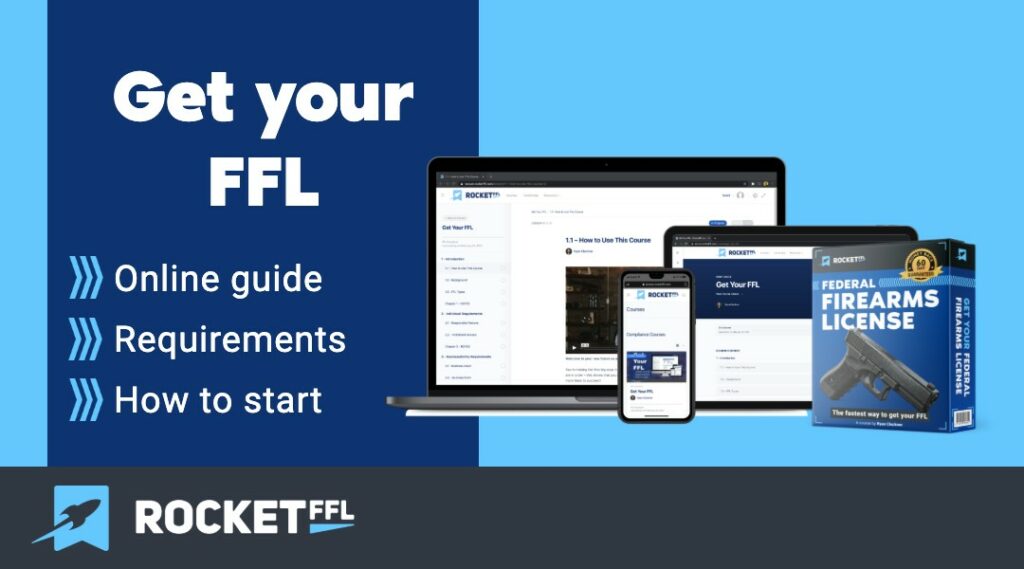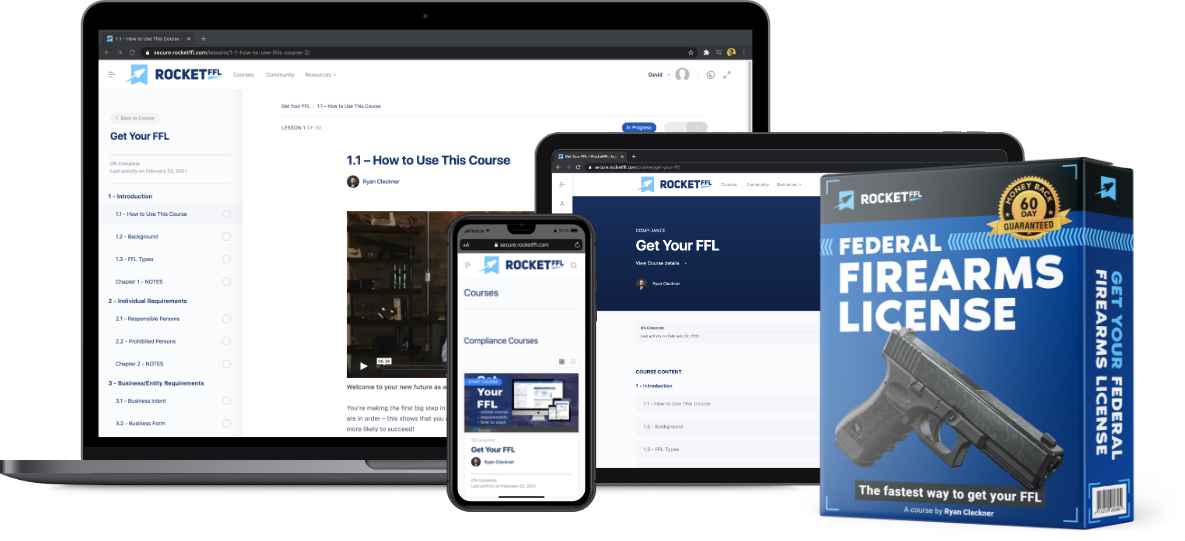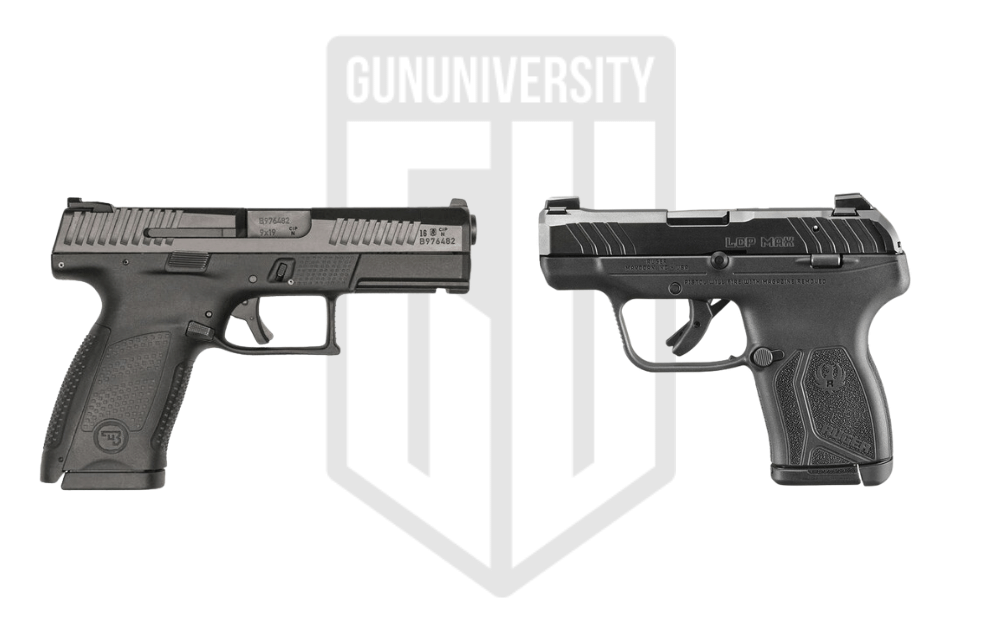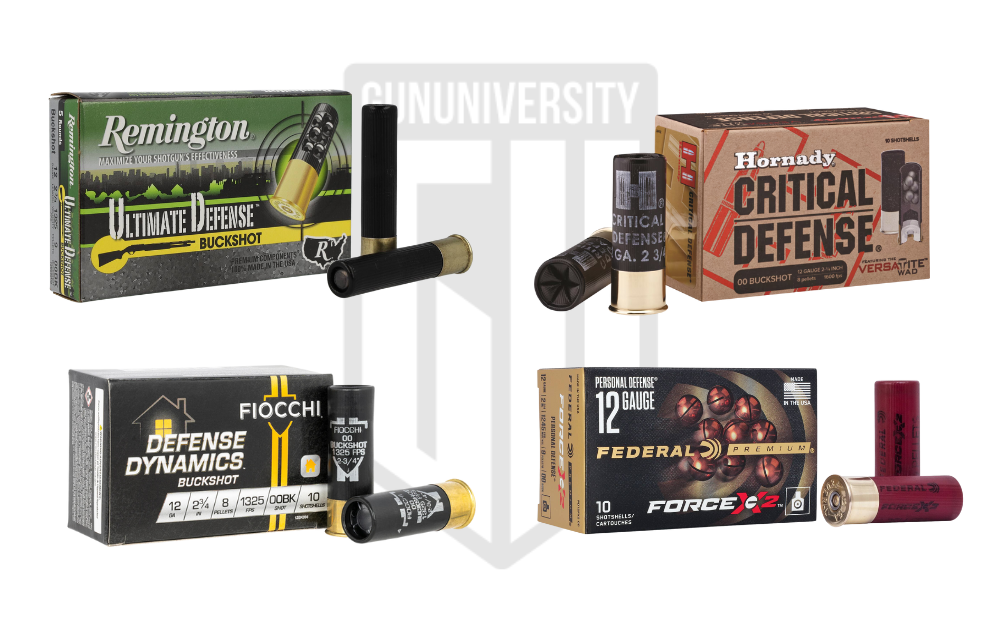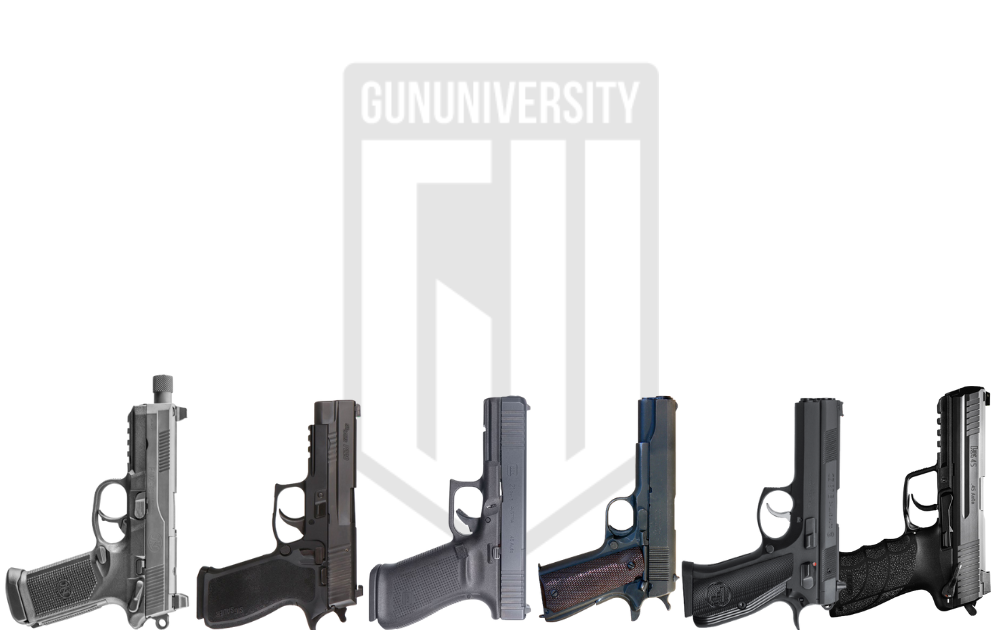How to Own a Machine Gun and Are Automatic Weapons Illegal?
Did you know that owning an automatic weapon is not entirely illegal in the United States? Despite their controversial nature and the complexity of laws surrounding them, it is still possible to legally possess one. In this article, we are going to tell you how to own a machine gun!
To jump to the point, there are actually two ways you can own machine guns or fully automatic weapons:
a. You aren’t a ‘prohibited person’, and you purchased an extremely expensive machine gun that was made before 1986 (starting at around $15,000), wait a year for the transfer via an ATF Form 4, and are in a relevant state that does not ban them.
b. Get a Federal Firearms License (FFL) which is very easy to get, if you have the right course to help you.
Sounds like a lot, and maybe a bit confusing? No problem. In this article, I’ll break down exactly what this means and all the nuances between the terms.
So, let’s dive into the world of automatic weapons and explore the legal landscape that governs their ownership, addressing the question: are automatic weapons illegal?
Key Takeaways
- Understanding Automatic Weapons involves understanding the differences between fully automatic and semi-automatic firearms.
- Owning an automatic weapon in the US is subject to federal, state, and local regulations as well as eligibility criteria for pre-1986 machine guns.
- Obtaining approval for owning a machine gun can be costly and complex due to rarity, expense, and extensive legal requirements.
Understanding Automatic Weapons
Before we get into the steps to legally owning fully automatic weapons, let’s first break down the terms most important to this discussion. The nuances, are very important when dealing with this.
Automatic weapons, often referred to as machine guns, have been at the center of numerous debates regarding gun control and public safety. These firearms, including the fully automatic machine gun and the fully automatic weapon, are designed to fire multiple rounds with a single pull of the trigger, distinguishing them from their semi-automatic counterparts, which require a separate trigger pull for each round fired. The term “assault weapon” is often used to describe certain automatic and semi-automatic firearms, further complicating the discussion.
How to Own a Machine Gun
As I said earlier, there are really two ways to own a machine:
- As a private citizen, you can own a fully automatic weapon if you are not a prohibited person, bought a machine gun made before 1986, apply for transfer, and live in a state that allows for it
OR
- You get a Federal Firearms License
Let’s break these down and exactly what it means.
Method 1: Private Ownership of a Machine Gun
For private ownership, there are three parts to it: Eligibility, Pre-1986 machine gun, and the transfer process. If you choose this method, note that it will take over 1 year to accomplish and cost somewhere over 10,000 USD – depending on the state of the machine gun you purchase.
Let’s explore each of these in detail:
Eligibility Criteria
The first requirement for owning a machine gun as a private citizen is being a “non-prohibited person”. Individuals who are deemed prohibited persons according to federal law are ineligible to own a machine gun. Examples of prohibited persons include:
- individuals who have been convicted of a crime punishable by more than one year in prison
- individuals who are unlawful users of controlled substances
- individuals subject to restraining orders.
In addition to being a non-prohibited person, a prospective machine gun owner must adhere to the regulations set forth by the National Firearms Act (NFA). This includes the registration of certain firearms, including fully-automatic firearms and short-barreled shotguns, with the federal government and paying a tax on the making and transfer of these firearms. Fulfilling these eligibility criteria is a key component of legally owning a machine gun.
Pre-1986 Machine Guns
An important factor to consider when seeking to own an automatic weapon is the significance of pre-1986 machine guns. The Firearms Owners Protection Act of 1986 was amended by the Hughes Amendment. This amendment officially prohibited the registration of new machine guns for civilian use. This means that only machine guns manufactured and owned prior to May 19, 1986, may still be legally owned and transferred through approved sales.
The restricted availability of pre-1986 machine guns has led to a significant increase in their cost and scarcity. Popular models such as M16s and Tommy Guns can command premium prices, often starting at $6,000-$10,000 and increasing depending on rarity and condition.
This increased cost and limited availability have transformed machine guns into more of an investment rather than practical firearms for many collectors and enthusiasts.
Obtaining Government Approval
Before legally owning an automatic weapon, prospective owners must obtain government approval. This involves completing an ATF Form 4 application and waiting for the federal government to process the application and perform a background check to ascertain eligibility. The ATF Form 4 is a document used to facilitate the transfer of ownership of machine guns.
The approval process for owning an automatic weapon can be time-consuming and may take several months to over a year to complete. During this process, patience is key as rushing or trying to evade the necessary steps could lead to legal penalties.
In most cases, this process can take over a year.
Adhering to the right procedures and obtaining governmental approval enables individuals to legally own an automatic weapon, in compliance with all relevant laws and regulations.
Steps to Privately Owning a Machine Gun
For those seeking to own a machine gun as an individual, the process involves several steps:
- Locate and purchase a legally registered machine gun manufactured prior to May 19, 1986.
- Submit an ATF Form 4 application to the NFA division of the ATF.
- Await approval from the federal government.
- Be cognizant of the relevant state and local laws governing machine gun ownership, as regulations differ by jurisdiction.
Method 2: Having an FFL
When it comes to getting a fully automatic weapon through an FFL, the process is not only faster, but also much cheaper.
All you need to do is meet the requirements to get an FFL, take a course to help you get an FFL and apply correctly, purchase a machine gun or make a machine gun (depending on your FFL type), and submit a ATF Form 2 or 3 (depending on making it or buying it).
While that last step sounds like the Form 4 above, it isn’t. A Form 2 to make your own machine gun is submitted after you make the gun (no pre-approval needed) and a Form 3 to have another FFL transfer a machine gun to you takes a couple of days.
As a note, if you’re buying a machine gun from another FFL, you’re going to need to have a “law letter” or “CLEO letter” or “LE Demo Letter” from a Chief Law Enforcement Officer (Sheriff or Chief of Police) requesting a demonstration of that particular machine gun for potential purchase by the agency.
Do you Need Help Getting an FFL?
There’s a course that will help you do that
Requirements to get an FFL
- Be a U.S. Citizen
- Be at least 21 years old
- Be legally allowed to possess a firearm and ammunition
- Have a location for conducting FFL activities ( home-based FFLs are the most popular FFLs in the country)
- Ensure that your business activity at that location meets zoning requirements
- Ensure you have NOT violated the Gun Control Act (GCA) or its regulations
- Ensure you have NOT lied on your FFL application
This is a quick guide to the requirements, but if you’d like to dig in and learn more, then be sure to check out our article on FFL requirements.
Take a FFL Course and Apply for Your FFL
Technically, you don’t have to take a course. However, believe me, you’ll want to. The process to get a FFL doesn’t take much time, however, without guidance, you could make mistakes and jeopardize your ability to get an FFL.
So, do yourself a favor and pick up a course that will walk you through each of the steps and ensure you you can get your FFL.
Purchase a Fully Automatic Weapon or Make One
Now that you have your FFL, which can take a couple of months to do, you can go ahead and buy any machine gun – it doesn’t have to be pre-1986. You’ll have access to manufacturers and other opportunities once you have your FFL.
Also, depending on the FFL type you get, you can also make a Machine gun. The methods by which to make one is outside the purview of this article, however, there are simple methods in which you can turn certain a semi automatic firearm into a full automatic weapon.
Filling Out Necessary Forms
If you’ve decided to buy a machine gun, you’ll need to fill out an ATF Form 3 and get approval first before transferring. You’re also going to need a letter from a Chief Law Enforcement Officer requesting a legitimate demonstration of the firearm. This Form 3 process takes less than few days to get, and you don’t have pay a transfer tax as long as you’ve also registered as an SOT after you got your FFL.
If you decided to turn a semi automatic firearm into a fully automatic weapon, then you can submit an ATF Form 2 after it is made (must also be an SOT). No waiting or approval needed.
Steps to Owning a Machine Gun as an FFL
So, in recap, for those seeking to own a machine gun as an FFL, the process involves several steps:
- Take a course and become an FFL
- Get a CLEO letter
- Fill out a form 3 application and wait a couple of days
- Receive machine gum
Or if you have a FFL license that allows you to manufacture:
- Take a course and become a FFL
- Make a machine gun
- Fill out a form 2
Federal Laws Governing Fully Automatic Weapons
Now that we’ve learned about the process by which you can get a machine gun, let’s look at the different laws governing fully automatic weapon ownership.
Several federal laws govern the ownership and use of a fully automatic weapon in the United States, including:
- The National Firearms Act (NFA)
- The Hughes Amendment
- The Firearm Owners Protection Act
- The Bureau of Alcohol, Tobacco, Firearms, and Explosives (ATF)
These laws provide a framework for regulating machine gun ownership and ensuring that only eligible individuals are able to legally possess and use such firearms.
A thorough grasp of these federal laws equips prospective machine gun owners to confidently navigate the complex legal landscape.
National Firearms Act (NFA)
The National Firearms Act (NFA) of 1934 is the primary legislation governing the ownership and use of automatic weapons in the United States. This act mandates the registration of fully-automatic firearms, also known as machine guns, with the federal government. It also imposes a tax on the making and transfer of these firearms, which must be paid by the owner. By regulating the possession of machine guns and other dangerous firearms, the NFA aims to protect public safety while preserving the rights of law-abiding gun owners.
Adherence to the NFA is vital for individuals aiming to own a machine gun. Failure to register an automatic weapon or pay the required taxes can result in severe legal penalties, including fines and imprisonment. Prospective machine gun owners must carefully follow the requirements of the NFA and any other applicable federal, state, and local laws to ensure a smooth and legal process for obtaining and owning an automatic weapon.
Hughes Amendment and the Firearm Owners Protection Act
The Hughes Amendment and the Firearm Owners Protection Act (FOPA) are two additional federal laws that have impacted the ownership of automatic weapons. Specifically, the Hughes Amendment, enacted in 1986, prohibits the production and sale of new machine guns for civilian use. As a result, only machine guns manufactured and owned prior to May 19, 1986, may still be legally owned and transferred through approved sales.
The FOPA, on the other hand, renders the transfer of machine guns to civilians made after May 19, 1986, illegal. This has significantly impacted the market for automatic weapons, making pre-1986 machine guns increasingly rare and expensive. The combination of the Hughes Amendment and the FOPA has effectively limited the accessibility of machine guns for non-FFLs, further emphasizing the importance of understanding and complying with all applicable federal laws.
Bureau of Alcohol, Tobacco, Firearms, and Explosives (ATF)
The Bureau of Alcohol, Tobacco, Firearms, and Explosives (ATF) plays a significant role in regulating automatic weapons in the United States. Tasked with processing applications for owning automatic weapons and upholding federal laws related to firearms, the ATF serves as the primary enforcement agency for the NFA and other relevant legislation.
Prospective owners must collaborate closely with the ATF throughout the approval process to ensure they comply with federal laws governing automatic weapons. This includes:
- Submitting accurate and complete ATF Form 4 applications
- Undergoing required background checks
- Adhering to any additional requirements set forth by the ATF
By cooperating with the ATF and following all applicable regulations, individuals can successfully navigate the complex process of legally owning an automatic weapon.
State and Local Regulations
In addition to federal laws, state and local regulations can also impact machine gun ownership and use. These regulations vary by jurisdiction, with some states implementing bans on machine guns and others imposing restrictions on their transportation and use.
Prospective machine gun owners, who wish to possess machine guns, should familiarize themselves with the specific regulations in their state and local jurisdiction to ensure compliance with all applicable laws.
State Bans on Machine Guns
Several states in the U.S. have instituted bans on machine guns, further complicating the landscape of automatic weapon ownership. States with bans on machine guns include:
- California
- Colorado
- Delaware
- Hawaii
- Illinois
- Iowa
- Louisiana
- Massachusetts
- Minnesota
- New Jersey
- New York
- Rhode Island
These state-level assault weapons ban often reflect heightened concerns about public safety, gun violence, and the potential for criminal misuse of automatic weapons.
For prospective machine gun owners in states with bans, the challenges of legally owning an automatic weapon are even greater. In these cases, individuals must carefully navigate both federal and state regulations to determine if legal ownership is possible and what specific requirements must be met. Knowledge of state-level bans and their implications is essential for gun owners seeking to own a machine gun legally.
Traveling with Automatic Weapons
When traveling with automatic weapons, it’s important to be aware of state and local regulations to avoid violating any laws. In general, when transporting an automatic weapon, you should:
- Ensure that it is unloaded
- Securely store it in a locked hard-sided container
- Check it as baggage
- Declare the firearm and/or ammunition to the airline
For individuals planning to travel internationally with firearms, there may be specific regulations and requirements that must be adhered to. These requirements can vary depending on the destination country and the specific type of firearm being transported. Researching and complying with all relevant regulations when traveling with automatic weapons is crucial to avoid legal issues and ensure a smooth journey.
The Reality of Owning an Automatic Weapon
Owning an automatic weapon is a complex and often expensive endeavor, with the rarity, expense, and lengthy approval process involved making it a significant undertaking for most individuals. Despite the challenges, some collectors and enthusiasts continue to pursue the legal ownership of automatic weapons, navigating the intricate web of federal, state, and local regulations to achieve their goal.
Rarity and Expense
The rarity of automatic weapons, particularly those manufactured prior to 1986, has driven up their cost and made them increasingly difficult to obtain. As a result, machine guns have become more of an investment than a practical firearm for many collectors and enthusiasts. Popular models such as M16s and Tommy Guns can command premium prices, often starting at $6,000-$10,000 and increasing depending on rarity and condition.
This increased cost and limited availability can be a deterrent for many prospective machine gun owners, particularly those who are not committed collectors or enthusiasts. With the challenges of locating a legally-registered machine gun, meeting eligibility requirements, and navigating the approval process, the reality of owning an automatic weapon can be daunting for most individuals.
Long Approval Process
The approval process for owning an automatic weapon can be time-consuming and may take several months to over a year to complete. This lengthy process is often seen as a necessary inconvenience to ensure that only eligible and responsible individuals are granted the privilege of owning such powerful firearms.
During the approval process, prospective machine gun owners must exercise patience and persistence. Rushing or trying to bypass the required steps could lead to legal penalties. By adhering to all applicable laws and regulations and working closely with the ATF, individuals can successfully navigate the complex process of legally owning an automatic weapon.
Summary
In conclusion, owning an automatic weapon in the United States is a complex and often challenging endeavor. With numerous federal, state, and local laws governing their ownership and use, prospective owners must navigate a web of regulations and requirements to legally possess these powerful firearms. Despite the hurdles, a dedicated few continue to pursue the legal ownership of automatic weapons, driven by a passion for collecting and preserving these rare and fascinating pieces of history. As the debate surrounding automatic weapons and their place in society continues, understanding the legal landscape and the realities of ownership is crucial for both gun enthusiasts and those advocating for change.
Frequently Asked Questions
Automatic weapons are not completely illegal in the U.S., but owning one is subject to a number of federal, state, and local regulations. Moreover, only machine guns manufactured before May 19, 1986, can be legally owned and transferred through approved sales.
A semi-automatic firearm fires only one bullet per trigger pull, while an automatic weapon, also known as a machine gun, fires multiple rounds with a single pull of the trigger.
The key federal laws governing the ownership and use of automatic weapons are the National Firearms Act, the Hughes Amendment, the Firearm Owners Protection Act, and the Bureau of Alcohol, Tobacco, Firearms, and Explosives.
To own an automatic weapon, one must complete an ATF Form 4 application and wait for the NFA division of the ATF to review it and conduct a background check.
Yes, there are state-level bans on machine guns in multiple states, including California, Colorado, Delaware, Hawaii, Illinois, Iowa, Louisiana, Massachusetts, Minnesota, New Jersey, New York, and Rhode Island.
Recent Posts
February 21, 2026
February 21, 2026
February 21, 2026
February 20, 2026

